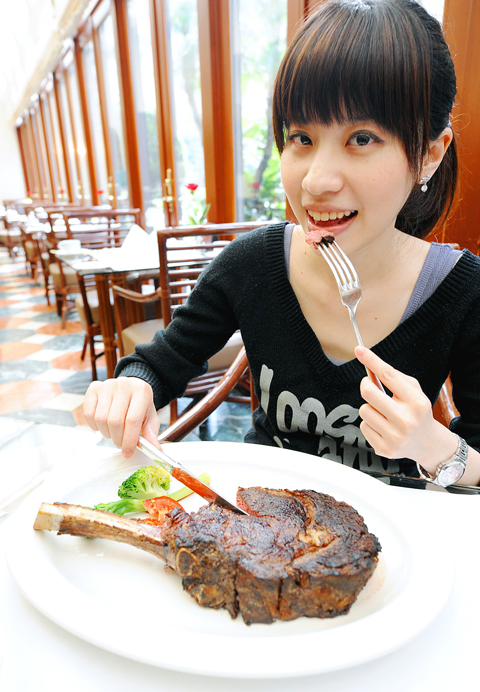The US will consider appealing to the WTO to resolve the row with Taiwan over US beef imports, Deputy US Trade Representative Demetrios Marantis said on Thursday in Washington.
Speaking at the Center for Strategic International Studies, Marantis said the Taiwanese legislature’s about-face on imports of US beef had “effaced sound science and effaced the protocol Taiwan and the US had negotiated,” and that he was very disappointed with the outcome.
He said that US beef was consistent with standards set by the World Organization for Animal Health and that Taiwan’s decision had no scientific basis. He made the same response when asked about the bans on US beef imports in South Korea and Japan.

PHOTO: CNA
A report quoted the US trade representative as saying the US was contemplating using all possible means to resolve its differences with Taiwan, including the WTO court.
Marantis was non-committal on when Trade and Investment Framework Agreement (TIFA) talks with Taiwan would be held.
The US has made clear its stance and the ball was in Taiwan’s court on how to approach the issue, he said, adding that Taiwan’s reputation as an international trading partner has been tarnished by the disagreement over beef.
The report said Canada also considered taking Taiwan to the WTO court for refusing to lift a ban on Canadian bone-in beef while giving the US the green light.
Earlier this week, a group of US academics suggest in a Web cast that the US should bring the beef issue to the WTO.
Commenting on Marantis’ remarks, the Bureau of Foreign Trade (BOFT) yesterday reiterated that the beef dispute should not become a barrier to bilateral economic ties, adding that the US’ interests remain secure in the case.
Bureau Director-General Huang Chih-peng (黃志鵬) said that Taiwan’s decision to ban imports of US ground beef and bovine offal should not become an issue because these products account for only a very small share of the beef trade between the two countries.
The US’ largest interests lie in bone-in beef, which accounts for more than 90 percent of its beef exports to Taiwan by dollar value, Huang said, adding that it has now regained access to Taiwan’s market.
“Taiwan has done its best to protect US trade interests,” he said.
Huang urged Washington to take into account its maximal profit from the beef trade in its decision on whether to resort to the WTO dispute settlement process.
He said the beef trade dispute was an “isolated incident” that should not be allowed to delay the resumption of talks between the two sides.
BOFT officials said in the event of a WTO arbitration case, Taiwan would be required to provide scientific evidence to back up its decision to ban imports of US ground beef and bovine offal, which could pose difficulties for Taiwan.
ADDITIONAL REPORTING BY JENNY W. HSU

TRAGEDY STRIKES TAIPEI: The suspect died after falling off a building after he threw smoke grenades into Taipei Main Station and went on a killing spree in Zhongshan A 27-year-old suspect allegedly threw smoke grenades in Taipei Main Station and then proceeded to Zhongshan MRT Station in a random killing spree that resulted in the death of the suspect and two other civilians, and seven injured, including one in critical condition, as of press time last night. The suspect, identified as a man surnamed Chang Wen (張文), allegedly began the attack at Taipei Main Station, the Taipei Fire Department said, adding that it received a report at 5:24pm that smoke grenades had been thrown in the station. One man in his 50s was rushed to hospital after a cardiac arrest

SAFETY FIRST: Double the number of police were deployed at the Taipei Marathon, while other cities released plans to bolster public event safety Authorities across Taiwan have stepped up security measures ahead of Christmas and New Year events, following a knife and smoke bomb attack in Taipei on Friday that left four people dead and 11 injured. In a bid to prevent potential copycat incidents, police deployments have been expanded for large gatherings, transport hubs, and other crowded public spaces, according to official statements from police and city authorities. Taipei Mayor Chiang Wan-an (蔣萬安) said the city has “comprehensively raised security readiness” in crowded areas, increased police deployments with armed officers, and intensified patrols during weekends and nighttime hours. For large-scale events, security checkpoints and explosives

A car bomb killed a senior Russian general in southern Moscow yesterday morning, the latest high-profile army figure to be blown up in a blast that came just hours after Russian and Ukrainian delegates held separate talks in Miami on a plan to end the war. Kyiv has not commented on the incident, but Russian investigators said they were probing whether the blast was “linked” to “Ukrainian special forces.” The attack was similar to other assassinations of generals and pro-war figures that have either been claimed, or are widely believed to have been orchestrated, by Ukraine. Russian Lieutenant General Fanil Sarvarov, 56, head

PUBLIC SAFETY: The premier said that security would be tightened in transport hubs, while President Lai commended the public for their bravery The government is to deploy more police, including rapid response units, in crowded public areas to ensure a swift response to any threats, President William Lai (賴清德) said yesterday after a knife attack killed three people and injured 11 in Taipei the previous day. Lai made the remarks following a briefing by the National Police Agency on the progress of the investigation, saying that the attack underscored the importance of cooperation in public security between the central and local governments. The attack unfolded in the early evening on Friday around Taipei Main Station’s M7 exit and later near the Taipei MRT’s Zhongshan